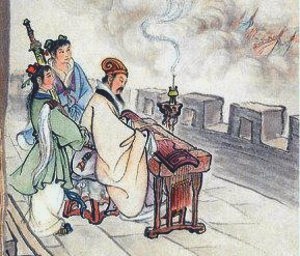CHAPTER 32: EMPTY CITY STRATEGY

Zhu Ge Liang in an empty city, picture taken from http://www.deceptology.com/2012-01/how-empty-fort-strategy-saved-town.html
Meaning and Philosophy
It needs much courage to use this strategy. In Western terms, it is called a bluff. You expose yourself, trusting that your opponent would think your exposure is a trap. If he does not fall into your bluff, you may be in big trouble. Its application is effective by someone who already has a high reputation, but in that particular situation he is caught unprepared.
Historical Source
During the Period of Three Kingdoms (220-280), the great strategist, Zhu Ge Liang, dispatched his main army under General Wei Ting to the east. He remained with 10,000 soldiers at Yang Ping.
The Wei general, Si Ma Yi, led 200,000 soldiers to attack Yang Ping. Zhu Ge Liang knew that his 10,000 soldiers would be no match against the Wei army. But to recall Wei Ting with the Shu army would be too late. So he came up with the “Empty City Strategy”.
He ordered all the soldiers and citizens of Yang Ping to leave the city, but he kept just about 20 soldiers to act as old citizen to sweep the streets and water plants. He also ordered all gates to the city be open.
When the Commander of the huge Wei army, Si Ma Yi, arrived at the city, he was very surprised at the situation. He looked into the city, and found it empty except a few citizens sweeping the streets and watering plants. He looked up at the city wall, and found Zhu Ge Liang sitting confidently alone playing a lute.
He thought for awhile and was about to order his army to retreat when his son, Si Ma Zhao, rode up to him and said, “Father, the city is empty. Why don’t we just enter and take it?”
Si Ma Yi replied solemnly, “Because the city is empty, we should not just enter and take it. Look at Zhu Ge Liang up there. He is a great strategist. All the time he has been very careful. This may his his trick. If we enter the city, we shall fall into his trick.”
Si Ma Yi turned around and order the army to retreat.
Si Ma Yi might have missed the chance to take the city, or more importantly, to capture Zhu Ge Liang. But it was better to be cautious. Si Ma Yi was cautious to live long enough to unite the three kingdoms into the Sui Dynasty.
Empty City to Save Zheng
Although the “Empty City Strategy” is usually accredited to Zhu Ge Liang, this strategy was first used in Chinese history more than 800 years ago. During the Spring-Autumn Period (770 475 BCE), in the year 666 BCE, Gong Zi Yuan led the Chu army to attack the State of Zheng.
The Chu army was successful, and was just outside the Zheng capital. The King of Zheng was panicky and summoned his ministers for advice. Some suggested surrendering, some suggested fighting to the last man, and some suggested holding on tenaciously.
A senior minister, Su Tan, said, “Surrendering and fighting stubbornly are not good strategies. Holding on tenaciously is worse. We have a treaty with the State of Qi. The Qi army would help us in times of war. If we can have a strategy to delay the Zheng army attacking us, the arrival of the Qi army could save us from being annexed.” Su Tan then explained his strategy.
The Zheng King followed this strategy. He ordered Zheng soldiers to hide themselves and not let the enemy noticed them. All shops in the city would carry on their business, and people continued to go along the streets, without showing any concern of war. The gates of the city were to be open, and the draw bridge leading into the city be put down without any signs of defence.
When the vanguards of the Chu army reached the Zheng capital, they were surprised that the Zheng capital was undefended. They dared not attack, and so waited for the arrival of Gong Zi Yuan. Gong Si Yuan was also very surprised to find the city open and undefended. He went up a nearby hill and found some Zheng soldiers in ambush.
Gong Zi Yaun was worried about an ambush. So he ordered the Chu army to be stationed near the Zheng capital so that he could gather more information.
Meanwhile the King of Qi received call for help from the King of Zheng. The Qi army combined with the armies of two other states, Lu and Song, marched towards the Zheng capital to help. When Gong Si Yuan heard the news, he thought to himself, “The combined armies of Zheng, Qi, Lu and Song will be formidable. So he ordered a retreat of the Chu army before the arrival of the rescue armies.
Slowing Down a Convoy for Ambush
During the Second World War (1939-1965), Soviet intelligence received information that the German army would use a particular road to convey food and medical supplies. The Soviet Command instructed a local regiment to lay land mines along the road.
But the regiment was short of explosives, and by the time supplies arrived, the convoy of food and medical supplies would have passed. The colonel commanding the regiment suddenly had a brilliant idea.
He ordered his soldiers to get pieces of wood, with the German words “Careful. Land Mines Underneath” written on top of the pieces, and have these wooden pieces driven into the road.
A few days later the commander of the convoy found pieces of wood jutting out from the road they were travelling through. He halted the convoy and came down from his vehicle to examine.
Finding the warning, he ordered the convoy to manouver gingerly through the road. This slowed down the convoy tremendously, and allowed the enemy soldiers to ambush them.
A Strange Telephone Call
In a small town in the United States, a certain house had a telephone number similar to that of a local cinema. Very often people mixed up the numbers and wrongly called the house when they wanted to call the cinema.
One evening the telephone in the house rang. The lady of the house took up the telephone. She heard a tired voice from the telephone asking, “Excuse me, at what time will the evening show start?”
“I’m sorry. You have got a wrong number,” the house lady replied.
“I see!” the man said, “The show has already started for half an hour. Thank you.” He then hung up.
The louse lady was puzzled by the strange telephone call. Later when her husband returned from work, she told her about this strange experience.
“That man didn’t call a wrong number,” her husband explained. “His wife wanted to see a show, but he didn’t. He must be very happy now enjoying a rest.”

Wrong number, picture taken from https://www.mid-day.com/articles/wrong-phone-number-nets-malay-man-dream-bride/187343
LINKS
Questions and Answers on the 36 Strategies -- Overview
